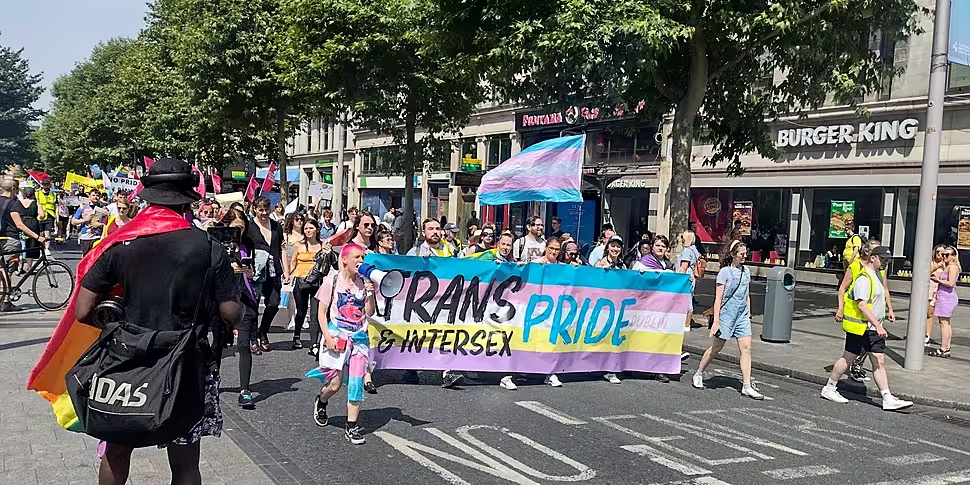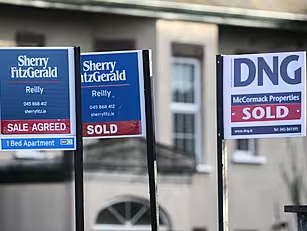Demonstrators marched from the Garden of Remembrance to Merrion Square in Dublin this afternoon, demanding trans and intersex rights be recognised and respected.
Trans and Intersex Pride Dublin outlined five core demands:
Firstly, free GP-led trans healthcare based on informed consent, wherein patients make decisions with the knowledge of all possible risks and benefits:
"Currently in Ireland, young trans people under the age of 17 have no way of accessing the healthcare they need through the public health service, whilst those over the age of 17 have one option: face waiting lists of up to ten years to be assessed through unscientific, traumatising and highly sexualised questions at the Loughlinstown clinic," organizers of the event said.
Secondly, the immediate banning of Intersex Genital Mutilation:
The Office of the United Nations High Commissioner for Human Rights defines IGM as harmful, involuntary or unnecessary medical interventions - they list typical forms of IGM as “feminising” or “masculinising” genital surgery, sterilising procedures, and forced genital exams. The OHCHR says IGM can cause lifelong severe physical and mental pain and suffering.
"Despite making up almost 2% of births, the fearmongering and misinformation surrounding intersex people mean they are more than often forced into the rigid boxes of male and female, with countless instances of their medical histories hidden from them or entirely destroyed, resulting in many intersex people not knowing about their identities until adolescence or adulthood," organizers said.
Dublin Trans and Intersex Pride is currently marching towards O'Connell Bridge. Thousands have turned out to call for better access to Trans and Intersex healthcare, the separation of church and state, fair treatment from the media, and a number of other intersectional issues pic.twitter.com/6nkqvJlJWG
— Michael Dooley (@MichaelDooley__) July 16, 2022
Thirdly, compulsive LGBTQIA+ inclusive secular relationships and sex education:
"A 2018 survey carried out by the Irish Secondary School Students' Union found that 90% of students in Ireland didn't receive regular relationships and sexual education classes. Religious patronage often results in classes holding up abstinence and failing to adequately address contraception and consent, let alone fully include queer identities and relationships," organizers said.
"Inclusive sex education, mandatory in all schools regardless of faith, would play a crucial role in bringing awareness and acceptance of young trans, non-binary and intersex people, and in challenging homophobia, transphobia and gender-based violence."
Fourthly, the separation of church and state:
"Queer liberation is impossible under a system committed to protecting the interest of the Catholic Church, whose control over healthcare and education was written into the formation of the Irish state. However, the struggles for marriage equality and abortion rights over the past decade have shown the iron will of (especially) young and working-class people to demand an end to Church intervention in the running of public services," organizers said.
Lastly, the end of homophobia and transphobia:
"The murders of Aidan Moffitt and Michael Snee earlier this year alongside the spike in violent attacks on LGBTQIA+ people generally has exposed the urgent need to protest and struggle against homophobia, transphobia and all prejudice against the community," organizers said.
"The crowd is so amazing - it's bigger than it used to be"
Sonia, who's a trans woman, was delighted with this afternoon's turnout.
"It's very important that we show up, and I'm glad the crowd is so amazing, so huge - it's bigger than it used to be," she said.
"For myself, I've completed my medical transition, and I've already changed my gender on paper, but I still don't feel equal, I don't feel liberated. I don't feel like I can achieve the same level of happiness as cisgender people."
"Others aren't as lucky as me - they're waiting seven or ten years to start medical treatment. If you go to the doctors today and tell them you're trans, that you want to start your transition, you could be seven years waiting.
"I just can't imagine that. It's terrible how long it takes."
"I felt concerned my children could be unsafe here"
One woman who brought her two young kids to the march felt that hateful rhetoric has skyrocketed in the past decade.
"I think there's a lot of right wing propaganda out at the moment. A couple of years ago I would never have felt unsafe taking my children to events like this, and this is the first year that I've actually felt concerned that my children could be unsafe here, because of the nonsense sentiments spread on social media," she said.
"I think it's important for young people to see that there is support out there for them and that there is a body of people they can identify with, who are willing to support them if they're questioning their identity."
"The first time I heard the phrase TERF (trans-exclusionary radical feminist) a few years ago I actually laughed - I didn't understand how somebody could be transphobic, I couldn't get my head around it.
"I don't think anyone is naturally transphobic. I think fears are instilled in them in very subtle ways, and we have to make sure we combat that."
"Vilified and oppressed for decades"
Amnesty International Ireland took part in the protest, praising the turnout as "phenomenal."
"It's just remarkable that so many people don't understand how vilified and oppressed the trans community have been for decades," a spokesperson said.
"Trans people are our friends, our cousins, our nieces and nephews, and this is a very important day to express solidarity with our trans brothers and sisters."













